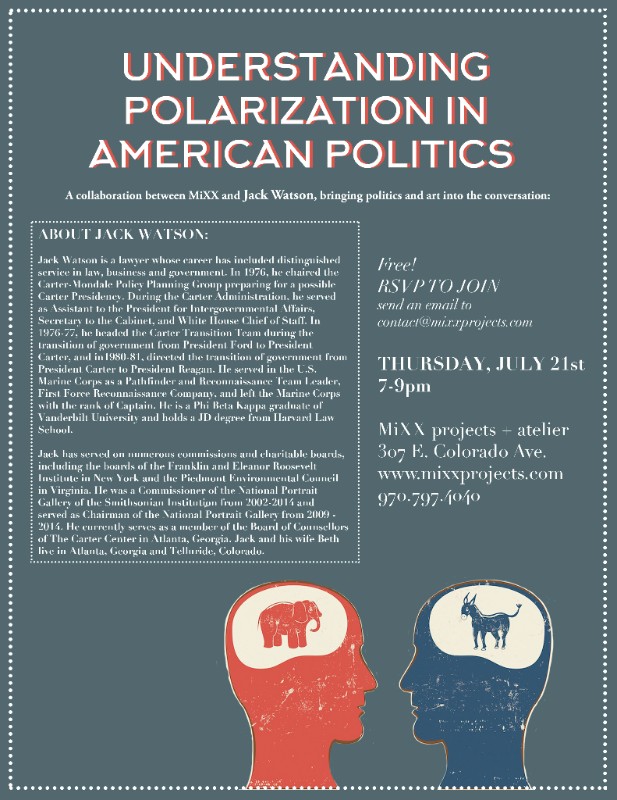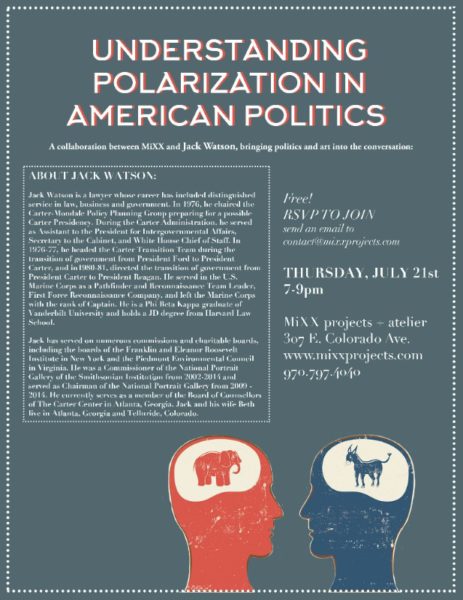
16 Jul MIXX: Understanding Polarization in American Politics
“Understanding Polarization in American Politics” is a FREE event at MIXX. Please email your RSVP to contact@mixxprojects.com or call 970-797-4040.
Are any of these questions on your mind today?
(Or I could ask: Are you breathing?)
Where are we in American politics and how did we get here?
How did so many Americans get so fed up with their government and the political leadership in both parties?
What is the “Tea Party,” where did it come from, and how has it impacted the Republican Party and the governance of our nation?
Do facts matter anymore in politics and policy-making?
Is the real issue party differences – or money. (Or, is money the root of all that’s wrong in politics today?)
Who is Donald J. Trump and how did he get to be head of the Republican Party?
Who is Hillary Rodham Clinton and why do so many Americans distrust and dislike her?
Want answers?

If your answer to wanting answers is a resounding ”yes,” then you will want to attend the upcoming salon at MIXX, 307 East Colorado on Thursday, July 21, 7 – 9 p.m., when lawyer and former presidential advisor Jack Watson speaks out at the upcoming “Understanding Polarization in American Politics.”
In 2014, Pew research conducted a study of polarization in America. The findings were as follows:
Political polarization is the defining feature of early 21st century American politics, both among the public and elected officials. As part of a year-long study of polarization, the Pew Research Center has conducted the largest political survey in its history – a poll of more than 10,000 adults between January and March of this year. It finds that Republicans and Democrats are further apart ideologically than at any point in recent history. Growing numbers of Republicans and Democrats express highly negative views of the opposing party. And to a considerable degree, polarization is reflected in the personal lives and lifestyles of those on both the right and left.
Here are 7 key findings on polarization in America today:
1.The share of Americans who express consistently conservative or consistently liberal opinions has doubled over the past two decades, from 10% to 21%. As a result, the amount of ideological overlap between the two parties has diminished. The “median,” or typical, Republican is now more conservative than 94% of Democrats, compared with 70% twenty years ago. And the median Democrat is more liberal than 92% of Republicans, up from 64%. Among Republicans and Democrats who are highly engaged in politics, 70% now take positions that are mostly or consistently in line with the ideological bent of their party.
That was then, just two years ago and again, already the differences between Right and Left were going beyond politic. Already compromise meant your side, the right side even if you defined yourself as left-leaning, got a bigger piece of the pie.
Since then, the slippery slope got further greased.
Or does it just seem that way?
In 1856, violence over slavery erupted in the chamber of the U.S. Senate, when an anti-slavery lawmaker from Massachusetts was caned on the Senate floor by a member of the House from South Carolina.
In 1804. nation’s first Treasury secretary, Alexander Hamilton, was killed in a duel by the sitting vice-president, Aaron Burr.
The late-Sixties was no picnic either. Raise your hands if you remember the emotional debates over racial equality and the Vietnam War? There was rioting and civil unrest in major cities and on college campuses across the country. In 1968 alone, Robert Kennedy, Martin Luther King and Malcolm X were all assassinated. And in 1972, the segregationist former governor of Alabama, George Wallace, was shot and paralyzed while campaigning for president.
Jack Watson will review the historical context and offer “an honest and wide-ranging discussion of the Presidential election this year and the current state of U.S. politics and governance.”
Specifically, Jack plans to address the current paralysis in our country and the all-pervasive sense of powerlessness.
He will define the term “anti-establishmentarianism” and suggest what role the notion is playing in the 2016 Presidential election.
He will examine both The Donald and Hillary under a magnifying glass.
Has there ever been a Presidential nominee of either political party like Trump?
What’s the difference between “truth-teller” and “demagogue?”
Will the Republican Party and Republicans in general coalesce behind their candidate and, if so, why?
Is Hillary not the archetypal establishment candidate and how will that affect the outcome of the election?
How will American voters gauge the value of Hillary’s experience in government and the contrast between her experience with that of Donald Trump?
Is she “trust-worthy?”
Will the fact Hillary is a woman be a major factor, plus or minus, in the election?
Questions beget questions, but in the end, it comes down to placing the current histrionics onto an historical continuum and wondering out loud, in the final analysis, when all the name-calling is over and the smoke clears, what kind of President do the American people want to lead the nation for the next four years?
About Jack Watson:
Jack Watson is a lawyer whose career has included distinguished service in law, business, and government.
In 1976, Jack chaired the Carter-Mondale Policy Planning Group preparing for a possible Carter Presidency. During the Carter Administration, he served as Assistant to the President for Intergovernmental Affairs, Secretary to the Cabinet, and White House Chief of Staff. In 1976-77, he headed the Carter Transition Team during the transition of government from President Ford to President Carter, and in 1980-81, directed the transition of government from President Carter to President Reagan. He served in the U.S. Marine Corps as a Pathfinder and Reconnaissance Team Leader, First Force Reconnaissance Company, and left the Marine Corps with the rank of Captain. He is a Phi Beta Kappa graduate of Vanderbilt University and holds a JD degree from Harvard Law School.
Jack has served on numerous commissions and charitable boards, including the boards of the Franklin and Eleanor Roosevelt Institute in New York and the Piedmont Environmental Council in Virginia. He was a Commissioner of the National Portrait Gallery of the Smithsonian Institution from 2002-2014 and served as Chairman of the National Portrait Gallery from 2009 – 2014. He currently serves as a member of the Board of Counsellors of The Carter Center in Atlanta, Georgia. Jack and his wife Beth live in Atlanta, Georgia, and Telluride, Colorado.


Sorry, the comment form is closed at this time.